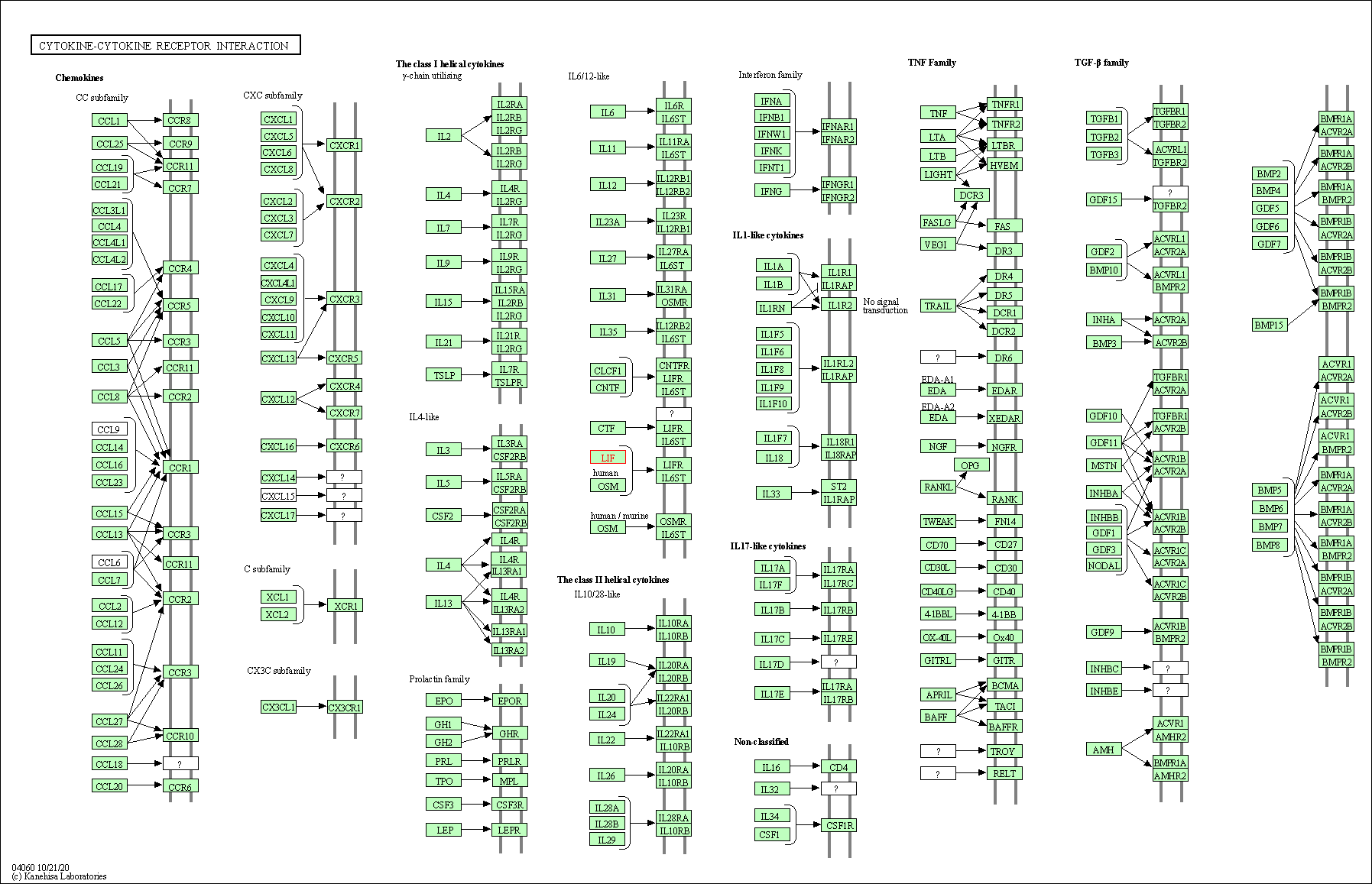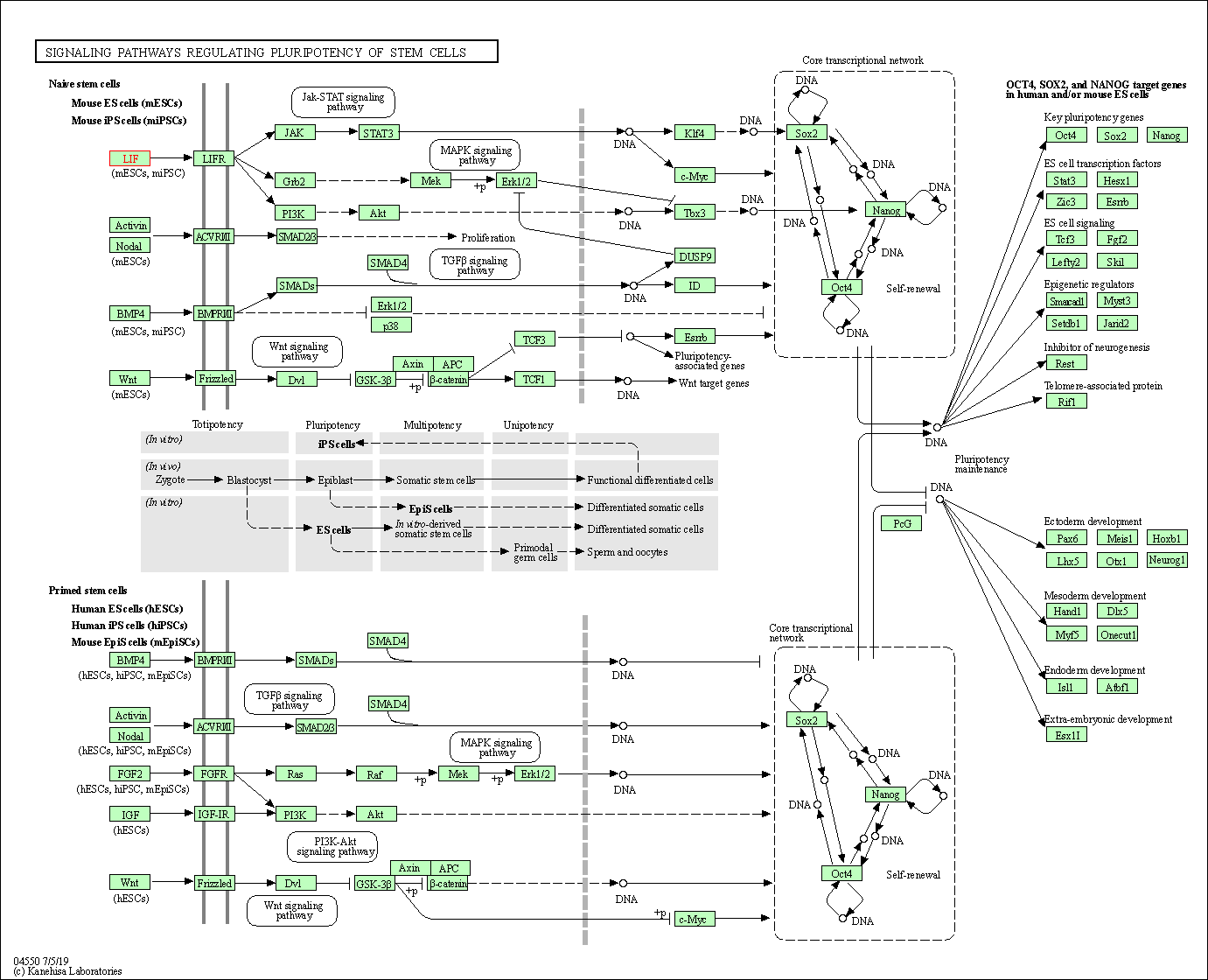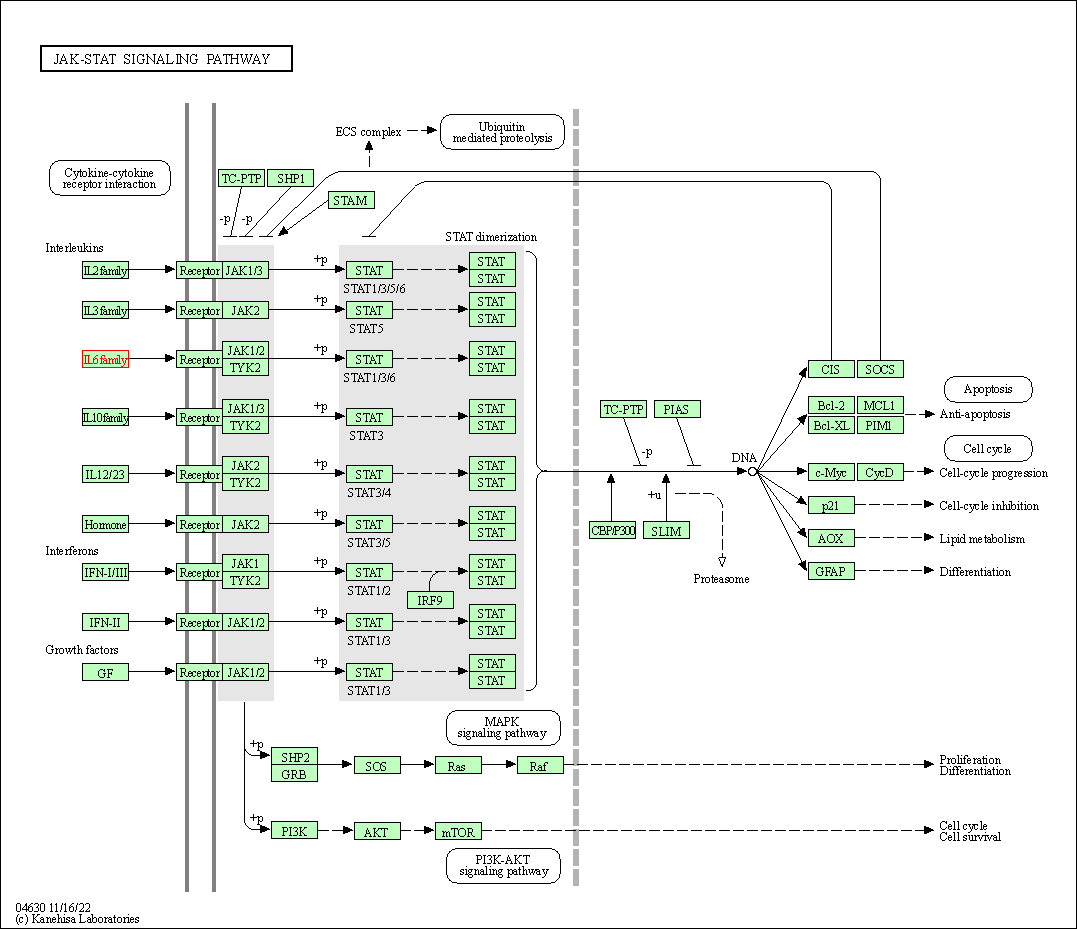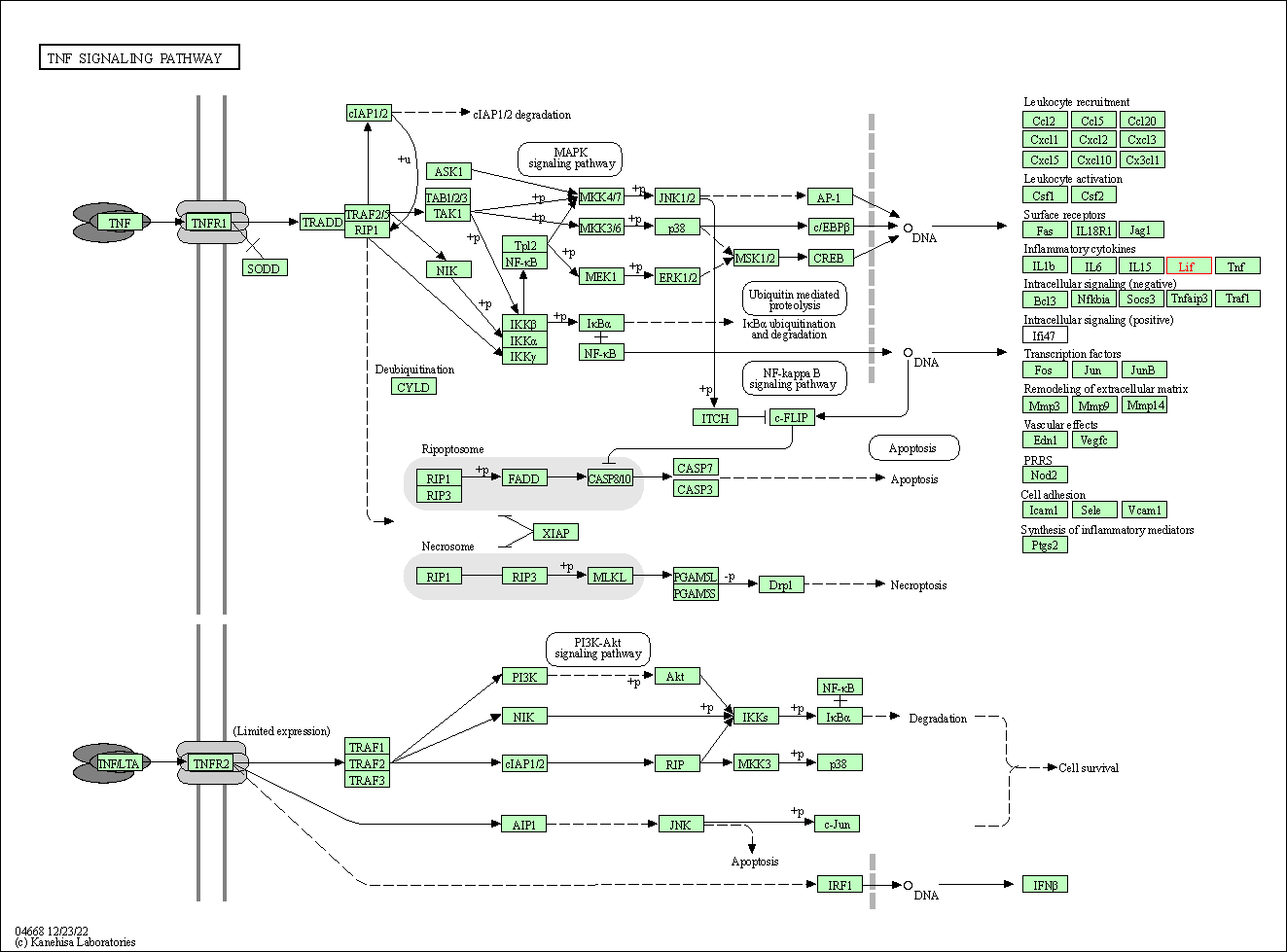Target Information
| Target General Information | Top | |||||
|---|---|---|---|---|---|---|
| Target ID |
T29774
(Former ID: TTDR00422)
|
|||||
| Target Name |
Leukemia inhibitory factor (LIF)
|
|||||
| Synonyms |
Melanoma-derived LPL inhibitor; MLPLI; HILDA; Emfilermin; Differentiation-stimulating factor; D factor
Click to Show/Hide
|
|||||
| Gene Name |
LIF
|
|||||
| Target Type |
Clinical trial target
|
[1] | ||||
| Disease | [+] 1 Target-related Diseases | + | ||||
| 1 | Solid tumour/cancer [ICD-11: 2A00-2F9Z] | |||||
| Function |
Its activities include the induction of hematopoietic differentiation in normal and myeloid leukemia cells, the induction of neuronal cell differentiation, and the stimulation of acute-phase protein synthesis in hepatocytes. LIF has the capacity to induce terminal differentiation in leukemic cells.
Click to Show/Hide
|
|||||
| UniProt ID | ||||||
| Sequence |
MKVLAAGVVPLLLVLHWKHGAGSPLPITPVNATCAIRHPCHNNLMNQIRSQLAQLNGSAN
ALFILYYTAQGEPFPNNLDKLCGPNVTDFPPFHANGTEKAKLVELYRIVVYLGTSLGNIT RDQKILNPSALSLHSKLNATADILRGLLSNVLCRLCSKYHVGHVDVTYGPDTSGKDVFQK KKLGCQLLGKYKQIIAVLAQAF Click to Show/Hide
|
|||||
| 3D Structure | Click to Show 3D Structure of This Target | PDB | ||||
| HIT2.0 ID | T21XA6 | |||||
| Cell-based Target Expression Variations | Top | |||||
|---|---|---|---|---|---|---|
| Cell-based Target Expression Variations | ||||||
| Different Human System Profiles of Target | Top |
|---|---|
|
Human Similarity Proteins
of target is determined by comparing the sequence similarity of all human proteins with the target based on BLAST. The similarity proteins for a target are defined as the proteins with E-value < 0.005 and outside the protein families of the target.
A target that has fewer human similarity proteins outside its family is commonly regarded to possess a greater capacity to avoid undesired interactions and thus increase the possibility of finding successful drugs
(Brief Bioinform, 21: 649-662, 2020).
Human Pathway Affiliation
of target is determined by the life-essential pathways provided on KEGG database. The target-affiliated pathways were defined based on the following two criteria (a) the pathways of the studied target should be life-essential for both healthy individuals and patients, and (b) the studied target should occupy an upstream position in the pathways and therefore had the ability to regulate biological function.
Targets involved in a fewer pathways have greater likelihood to be successfully developed, while those associated with more human pathways increase the chance of undesirable interferences with other human processes
(Pharmacol Rev, 58: 259-279, 2006).
Biological Network Descriptors
of target is determined based on a human protein-protein interactions (PPI) network consisting of 9,309 proteins and 52,713 PPIs, which were with a high confidence score of ≥ 0.95 collected from STRING database.
The network properties of targets based on protein-protein interactions (PPIs) have been widely adopted for the assessment of target’s druggability. Proteins with high node degree tend to have a high impact on network function through multiple interactions, while proteins with high betweenness centrality are regarded to be central for communication in interaction networks and regulate the flow of signaling information
(Front Pharmacol, 9, 1245, 2018;
Curr Opin Struct Biol. 44:134-142, 2017).
Human Similarity Proteins
Human Pathway Affiliation
Biological Network Descriptors
|
|
|
There is no similarity protein (E value < 0.005) for this target
|
| KEGG Pathway | Pathway ID | Affiliated Target | Pathway Map |
|---|---|---|---|
| Cytokine-cytokine receptor interaction | hsa04060 | Affiliated Target |

|
| Class: Environmental Information Processing => Signaling molecules and interaction | Pathway Hierarchy | ||
| Signaling pathways regulating pluripotency of stem cells | hsa04550 | Affiliated Target |

|
| Class: Cellular Processes => Cellular community - eukaryotes | Pathway Hierarchy | ||
| JAK-STAT signaling pathway | hsa04630 | Affiliated Target |

|
| Class: Environmental Information Processing => Signal transduction | Pathway Hierarchy | ||
| TNF signaling pathway | hsa04668 | Affiliated Target |

|
| Class: Environmental Information Processing => Signal transduction | Pathway Hierarchy | ||
| Degree | 17 | Degree centrality | 1.83E-03 | Betweenness centrality | 4.47E-04 |
|---|---|---|---|---|---|
| Closeness centrality | 2.30E-01 | Radiality | 1.41E+01 | Clustering coefficient | 3.82E-01 |
| Neighborhood connectivity | 4.02E+01 | Topological coefficient | 1.25E-01 | Eccentricity | 11 |
| Download | Click to Download the Full PPI Network of This Target | ||||
| Target Regulators | Top | |||||
|---|---|---|---|---|---|---|
| Target-regulating microRNAs | ||||||
| References | Top | |||||
|---|---|---|---|---|---|---|
| REF 1 | Biomarkers in psoriasis and psoriatic arthritis. Ann Rheum Dis. 2013 Apr;72 Suppl 2:ii104-10. | |||||
| REF 2 | ClinicalTrials.gov (NCT03490669) Study to Evaluate Safety, PK, PD, Immunogenicity & Antitumor Activity of MSC-1 in Patients With Adv Solid Tumors. U.S. National Institutes of Health. | |||||
If You Find Any Error in Data or Bug in Web Service, Please Kindly Report It to Dr. Zhou and Dr. Zhang.

